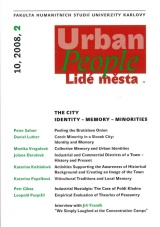Peeling the Bratislava Onion
(Collective Memory in Incomplete Communities)
DOI:
https://doi.org/10.14712/12128112.3706Klíčová slova:
Bratislava, Jews, collective memory, 20th centuryAbstrakt
In his memoirs, Günter Grass used the analogy of “peeling the onion” and he gradually peeled off layers of his memories. This procedure did not work in researching the Bratislava (not only the Jewish) society of the 20th century. Due to historic events, several significant city-forming elements of the inhabitants disappeared from the Bratislava demographic map (but also from the memory of most contemporaries). Prior to the Holocaust, Orthodox Jews predominated in the city. Today, they make up a negligible, even forgotten minority. A similar fate affected the Zionists, too. According to available data, 10,000 Jewish people left Slovakia between 1945 and 1949; of them, 90% chose Palestine/Israel as their target country. Migrants from the countryside replaced them. However, they were not able to make up for past losses, either in terms of quantity or quality. There was enough evidence that “peeling of onion” is not suitable if the studied sample does not represent a whole spectrum of a given environment. If this method were mechanically applied, it would result in a simplified picture of both the Jewish community and the city in which it lived. It is also important to consider the fact that the Holocaust influenced not only the demographic community structure, but also the value system of its members. Thus, there is the seemingly paradoxical procedure of “wrapping the onion up.”
Stahování
Publikováno
Jak citovat
Číslo
Sekce
Licence

Tato práce je licencována pod Mezinárodní licencí Creative Commons Attribution-NonCommercial-NoDerivatives 4.0.


